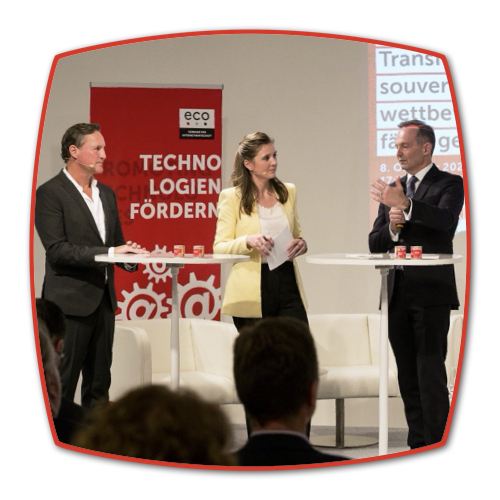
Events and Highlights of the Policy, Law & Regulations Division 2024
In 2024, the Policy, Law & Regulations Division organised a large number of events, either in the eco Capital Office premises or in external locations. A total of around 963 participants took part in the 2024 events.
The events of the Policy, Law & Regulations division are primarily aimed at political representatives and interested stakeholders from the political arena in Berlin and Brussels, as well as eco member companies. The eco Association’s target group includes federal ministers, state secretaries, spokespersons on Internet policy from parliamentary groups, members of the German Bundestag and their colleagues, and representatives of the ministries and federal states.
As per tradition, the year 2024 also began with the New Year’s Reception in Berlin. Multiple additional events took place in 2024, such as the roundtables, polITalks, Alliance Talks and other well-known formats such as Policy Talks and Policy Breakfasts.
An excerpt of the event highlights from the division is set out below:
Alliance Talk on the Energy Efficiency Act: “We Give Data a Home! The Data Centre Industry in Germany”
The Alliance Talk “We Give Data a Home! The Data Centre Industry in Germany”, held on Wednesday, 15 May 2024, at BASECAMP Berlin, brought together representatives from the Internet industry, users and politics to discuss both the significance and the necessary framework conditions for data centres in Germany as a location.
Data centres – in all their forms – are crucial for the digital transformation of both the economy and society. They are part of an ecosystem that enables communication via emails, online shopping, smart production lines, or the application of artificial intelligence (AI).
AI was of crucial importance in the debate about the necessity of secure and high-performance digital infrastructures. This is because the training and application of the technology requires a large amount of data, some of which is also sensitive.
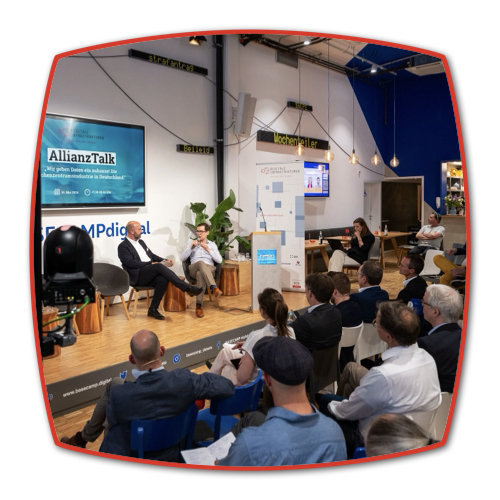
In the panel discussion moderated by Alexa von Busse, the implications of the German Energy Efficiency Act, lengthy building permit procedures and high electricity prices regarding the future viability of Germany as a digital location were debated.
Politicians who took part in the discussion included: Nicolas Zippelius, Member of the German Bundestag for the CDU; Maximilian Funke-Kaiser, Member of the German Bundestag for the FDP; and Dr. Jens Zimmermann, Member of the German Bundestag for the SPD. From a user perspective, Dr. Bernd Lohmann, CTO of Bayer AG, reported, while Carsten Kestermann, Head of AWS Public Policy DACH, shared the operator’s perspective.
The discussion made it clear that Germany as a digital location possesses numerous strengths – not least thanks to DE-CIX, the world’s largest Internet Exchange. However, to be prepared for future requirements, it is essential to invest now and to also shape the political framework conditions so that AI will continue to have a home in Germany.
Here you can find images of the event and a German-language video recap. You can watch the entire Alliance Talk here.
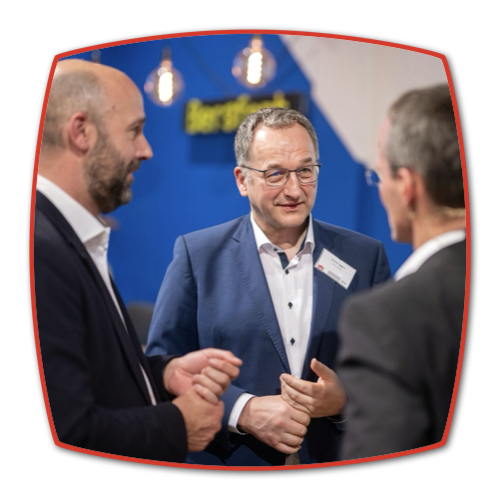
eco “KI Future Tech Summit”: What artificial intelligence can already do today
Perspectives and best practices from companies and politics
How significant is artificial intelligence for Germany’s competitiveness as a digital location? How must regulatory frameworks be designed to avoid stifling innovation, but rather focus on opportunities? Which lighthouse projects and AI pioneers from the German corporate landscape can serve as blueprints to enable more companies to use artificial intelligence?
These questions were discussed by eco – Association of the Internet Industry at the German “KI Future Tech Summit” on 11 June 2024 at the Microsoft Atrium in Berlin. The summit also marked the conclusion of the German-language KI Future Tech project, initiated by eco in collaboration with Microsoft Germany. This summit aimed to demonstrate how AI is already being used in business and industry in Germany through concrete best cases from renowned German companies such as Boehringer Ingelheim, Bosch, Otto Group and Siemens, thereby making AI solutions and opportunity potentials tangible and experiential.
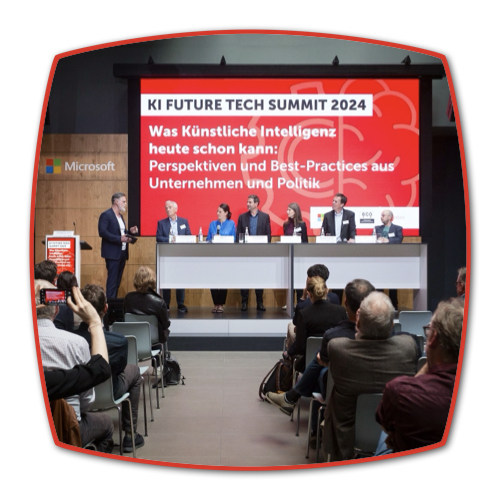
The event focused on the opportunities and potential of artificial intelligence for Germany as a digital location, as well as current political and regulatory issues.
“The potential of artificial intelligence and its impact on efficiency, productivity and innovation are enormous”, said Wolfgang Dierker, General Manager Corporate, External & Legal Affairs at Microsoft Germany, in his welcoming keynote speech. “Our successful customer projects in artificial intelligence show how quickly, for example, industrial companies can make human-machine collaboration more productive through generative AI.”
To the Flickr photo album
To the KI Future Tech project page
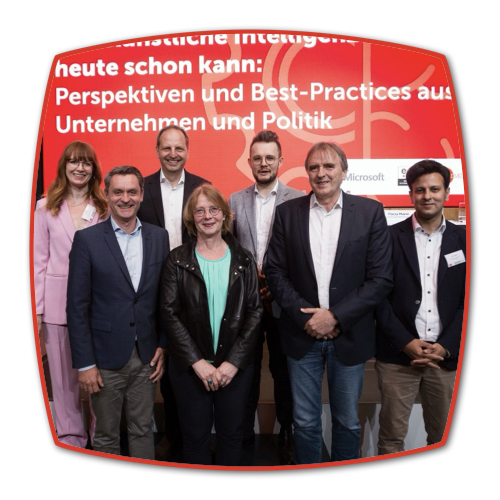
Internet Policy Forum 2024: Internet industry and politicians discuss Germany’s digital strategy
At this year’s Internet Policy Forum, titled “Trust and Security in the Digital World – Shaping the Digital Transformation with Confidence and Competitiveness”, decision-makers from politics and the Internet industry, along with around 100 guests, gathered at Berliner Freiheit on 8 October 2024.
Rising geopolitical tensions are fueling the discussion about the security and resilience of digital and critical infrastructures and society as a whole. In the ongoing debate about security and trust in digital technologies, Germany must continuously define its role in the digital world. In doing so, it is important to strike a balance between digital sovereignty and international cooperation. How can potential conflicts of objectives between security and resilience requirements and international networking and digital competition be avoided and reconciled with each other?
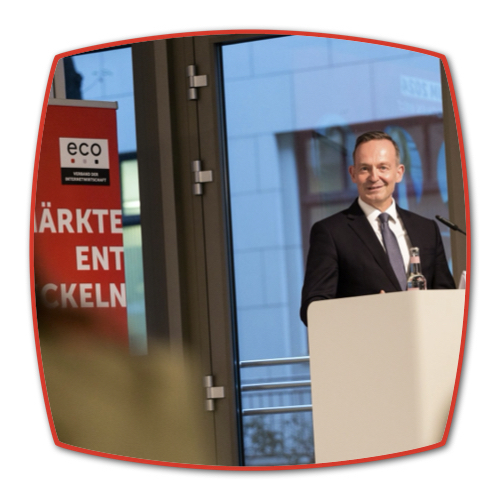
Where do we stand in terms of digital transformation? Which digital policy priorities must be at the top of the political agenda in order to ensure that Germany remains a sovereign, competitive digital location for the future? How much digital sovereignty can – and must – we afford?
Together with experts from politics, science and companies, current digital policy issues and possible solutions were discussed.
After a welcome by Oliver Süme and an opening keynote speech by Volker Wissing, Germany’s Federal Minister for Digital and Transport, Alexa von Busse then guided the audience through the evening’s programme.
Key topics during the keynote sessions and focus talks included the question of digital sovereignty in Europe, the prerequisites for achieving it, and the conditions for Germany to remain a competitive digital location. With conversations about digital transformation and how it can be shaped, the discussion continued during the subsequent networking session.
